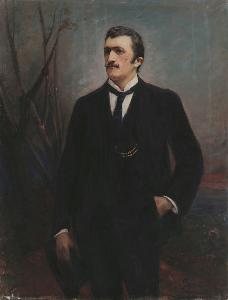Ponziano Loverini
Ponziano Loverini
Place: Gandino
Born: 1845
Death: 1929
Biography:
Ponziano Loverini was an Italian painter, known primarily for his canvases and frescoes of sacred subjects. He was born in Gandino, Italy in 1845 and died in 1929. As a pupil of the painter Enrico Scuri at the Accademia Carrara in Bergamo, Loverini developed his skills in the traditional techniques of Italian art.
Early Career and Influences
Loverini's early career was marked by his participation in various exhibitions, including the Milan: St Bishop Philastrius in 1881 and the Turin exhibition of 1884, where he showcased his large canvas depicting St Francis entering a monastic order. These early works demonstrate his focus on sacred subjects and his emerging style, which would become characteristic of his later pieces.
Notable Works and Commissions
Some of Loverini's most notable works include the frescoes he painted for the Chapel of Monuments in the Cimitero Unico of Bergamo, where he depicted the four biblical figures: Job, Ezekiel, Jeremiah, and Tobit. Additionally, he worked on a cycle of frescoes depicting the Story of St Peter for the parish church of Trescore Balneario in 1887. His work also includes frescoes in the Basilica of San Pietro in Ciel d'Oro in Pavia.
Artistic Style and Legacy
Loverini's artistic style is characterized by his use of traditional techniques and his focus on sacred subjects. His work has been recognized for its beauty and emotional depth, making him a notable figure in the world of Italian art. As an artist, he was part of a long tradition of painters who focused on depicting scenes from the Bible and the lives of saints.
- His paintings are known for their sacred themes and traditional techniques.
- Loverini's work has been exhibited in various locations, including Milan and Turin.
- He was a pupil of the painter Enrico Scuri at the Accademia Carrara in Bergamo.
- Loverini's legacy continues to be celebrated through his artwork, which can be found in various museums and collections.
works by Loverini include his frescoes for the Chapel of Monuments and his cycle of frescoes depicting the Story of St Peter. These pieces demonstrate his skill in capturing the essence of sacred subjects and his contribution to the world of Italian art. For more information on Ponziano Loverini and his artwork, visit https://Wikioo.org/@/Ponziano-Loverini.

